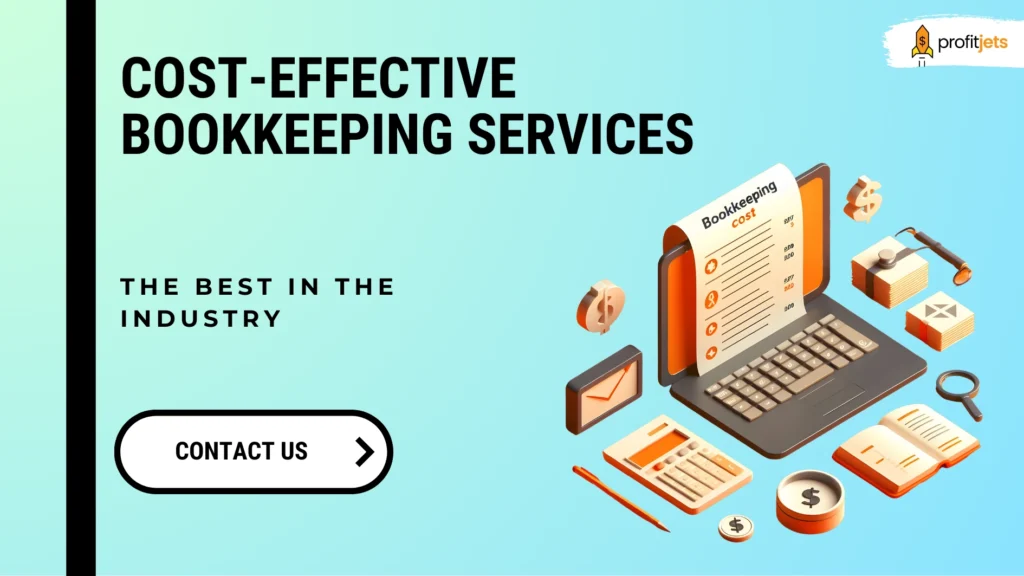Running a small business is a thrilling roller coaster a rush of new ventures, exciting possibilities, and the ever-present need for clarity amidst the chaos. One crucial yet often perplexing concern arises when managing your finances: Bookkeeping costs.
Table of Contents
Why is Bookkeeping Important for Small Businesses?
While the allure of diving into new projects and chasing ambitious goals may be tempting, ignoring your financial records is akin to flying blindfolded. Accurate and timely bookkeeping is the bedrock of any successful business, providing essential insights for informed decision-making, maximizing profitability, and ensuring compliance with regulations. A bookkeeper’s day-to-day bookkeeping tasks are explained next.
Types of Bookkeeping
Here’s a breakdown of the most common bookkeeping methods:
- Single-Entry Bookkeeping: This is a basic system where only income and expenses are recorded. It doesn’t track assets, liabilities, or owner’s equity, making it suitable only for very small businesses with simple finances.
- Double-Entry Bookkeeping: This more comprehensive system records every financial transaction twice – once for its effect on an asset/liability account and once for its effect on an income/expense account. This method ensures accuracy and allows for the creation of crucial financial statements like balance sheets and income statements.
What does a Full-time Bookkeeper do?
A dedicated full-time bookkeeper is your financial navigator. They meticulously record every transaction, manage accounts payable and receivable, process payroll, generate reports, and keep you compliant with tax laws. They are the meticulous stewards of your financial health, ensuring accuracy and efficiency in every aspect of your money matters.
Why should you Outsource Bookkeeping?
However, Hiring a full-time bookkeeper can be expensive for small businesses, especially during the crucial growth phase. This is where outsourcing bookkeeping emerges as a knight in shining armor. By partnering alongside a reliable bookkeeping service provider, you gain access to experienced professionals for a fraction of the cost, freeing up your valuable time and resources to focus on what you do best – running your business.
How much is a Bookkeeping Cost? – By Region
Understanding that bookkeeping costs can vary depending on location is a good start, but let’s dive deeper into the regional differences to equip you with more specific information. Here’s a breakdown of average monthly costs for bookkeeping services across key regions:
North America:
- Urban areas: In bustling metropolises like New York, Chicago, or San Francisco, expect to pay between $500 and $2,000 monthly for essential bookkeeping services. Specialized tasks like payroll or tax preparation can push the cost even higher.
- Suburban areas: The average cost is slightly lower in suburban zones near major cities, ranging from $400 to $1,500 monthly.
- Rural areas: Smaller towns and rural communities within North America offer the most budget-friendly options, with average monthly costs between $300 and $1,000.
Europe:
- Western Europe: Countries like Germany, France, and the UK have average monthly costs for basic bookkeeping services between‚ 400 and 1,500. Cities like London and Paris naturally command higher fees.
- Eastern Europe: In countries like Poland, Hungary, and the Czech Republic, costs are generally lower, averaging between 250 and 800 per month.
- Nordic Europe: Denmark, Sweden, and Finland have higher living costs, translating to bookkeeping fees ranging from 500 to 1,200 per month on average.
Asia-Pacific:
- Developed economies: Major hubs like Singapore, Hong Kong, and Australia have average monthly costs between $500 and $1,000 for basic bookkeeping services. Additional complexities can push the cost up to $1,500.
- Emerging economies: Countries like India, Vietnam, and Indonesia offer more affordable options, with average monthly costs ranging from $200 to $600.
Remember: These are only averages, and the actual cost can vary considerably within each region depending on factors like industry, individual service provider, and the complexity of your business needs.
Additional Tips:
- Consider online bookkeeping firms, which may offer competitive rates compared to local providers.
- Look for packages or bundled services that cater to your specific needs.
- Feel free to negotiate with potential providers based on your business size and volume of transactions.
By understanding the regional nuances and factoring in relevant details about your business, you can make informed decisions when comparing bookkeeping costs and finding the perfect service provider that fits your budget and needs.
Bonus: When researching providers, consider certifications and experience related to your industry. For example, if your business operates in e-commerce, finding a bookkeeper familiar with online marketplaces and inventory management can be invaluable.

Basic Bookkeeping Costs
The cost of bookkeeping can vary depending on several factors, but even basic bookkeeping requires an investment. Here’s a breakdown of some core costs involved:
- Bookkeeping Software: Accounting software like QuickBooks or Xero simplifies data entry, automates tasks, and streamlines bookkeeping processes. Subscription fees typically range from $10 to $50 per month for basic plans.
- Bookkeeping Supplies: This might include physical ledgers (less standard now), binders, folders, and other record-keeping materials. Costs can be minimal but can add up over time.
- Bookkeeping Training: If you manage bookkeeping in-house, you might invest in training resources like online courses or workshops. Costs can vary depending on the program but range from $50 to a few hundred dollars.
Even with basic bookkeeping, the time investment can be significant. Consider the opportunity cost of handling bookkeeping yourself versus focusing on core business activities.
Part-Time Bookkeeping Cost
Hiring a part-time bookkeeper can be a cost-effective option for businesses with moderate bookkeeping needs. Here’s what to expect:
- Hourly Rate: Part-time bookkeepers typically charge an hourly rate, ranging from $20 to $50 per hour, depending on experience and location.
- Estimated Monthly Cost: Consider the estimated number of hours your bookkeeping requires per month. Multiplying this by the hourly rate will give you a ballpark figure for the monthly cost. For example, if you require 10 hours of bookkeeping per month at an hourly rate of $30, the estimated monthly cost would be $300.
- Benefits: Since part-time bookkeepers are not typically considered employees, you wouldn’t be responsible for providing benefits like health insurance or paid time off.
Pros:
- Cost-effective solution for moderate bookkeeping needs.
- Access to professional expertise for improved accuracy and efficiency.
Cons:
- Limited availability compared to a full-time bookkeeper.
- It may not be suitable for complex bookkeeping requirements.
Full-Time Bookkeeping Cost
Hiring a full-time bookkeeper offers dedicated support but comes with a higher cost. Here’s a breakdown:
- Salary: Full-time bookkeeper salaries vary based on experience, location, and industry. Expect a range of $3,000 to $5,000 per month for an experienced bookkeeper.
- Benefits: As an employee, you’ll be responsible for providing benefits like health insurance, payroll taxes, and paid time off. This can add 30-40% to the base salary.
Pros:
- Dedicated, reliable support for all your bookkeeping needs.
- In-depth knowledge of your business finances for better financial insights.
Cons:
- Higher overall cost compared to part-time or outsourced options.
- It may not be necessary for businesses with minimal bookkeeping needs
Outsourced Bookkeeping Cost
Outsourced bookkeeping services can be a flexible and cost-effective solution for businesses of all sizes. Here’s what to consider:
- Monthly Packages: Many outsourced bookkeeping firms offer tiered monthly packages based on the complexity of your needs. Costs can range from $500 to $2,500
- Hourly Rate: Some outsourced bookkeepers might offer hourly billing options suitable for businesses with unpredictable bookkeeping needs. Expect hourly rates similar to part-time bookkeepers, ranging from $20 to $50 per hour.
- Scalability: A major benefit of outsourced bookkeeping is its scalability. You can quickly increase or decrease service levels as your business needs evolve.
Pros:
- Compared to a full-time bookkeeper, it is a cost-effective solution, especially with benefits factored in.
- Access to a team of experienced professionals with diverse expertise.
- Scalable service adapts to your growing business needs.
Cons:
- Less direct control over the bookkeeping process compared to an in-house bookkeeper.
- Communication and collaboration might require extra effort.
Factors that impact on Bookkeeping Cost
Beyond location and business size, several other factors can influence the cost of your bookkeeping services:
- Experience and qualifications: Seasoned professionals and certified bookkeepers will naturally command higher rates than entry-level bookkeepers.
- Technology and software: Using robust accounting software and automation tools can increase efficiency and potentially lower costs.
- Frequency of service: Do you need daily, weekly, or monthly bookkeeping services? The more frequent the need, the higher the cost.
Reasons to Hire a Bookkeeper
Even if you’re a numbers whiz, there are compelling reasons to consider hiring a professional bookkeeper:
- Save Time & Focus on Growth: Bookkeeping can be time-consuming. Freeing yourself from these tasks lets you focus on core business activities that drive growth and profitability.
- Improved Accuracy & Efficiency: Professional bookkeepers have the expertise and experience to ensure your financial records are accurate and up-to-date. This minimizes errors and helps you make informed business decisions.
- Compliance & Peace of Mind: Bookkeepers stay current on tax regulations and ensure your business meets all filing requirements. This provides peace of mind, knowing you’re compliant with tax authorities.
- Financial Insights & Strategic Planning: Having accurate and organized financial data allows bookkeepers to generate valuable reports and identify trends. These insights can inform your strategic planning and future business decisions.
- Scalability & Expertise: As your business grows, your bookkeeping needs will too. A bookkeeper can scale their services to accommodate your changing requirements, and their expertise can adapt to address new complexities.
Hiring a bookkeeper is an investment, but its benefits can significantly outweigh the cost. Whether you choose basic bookkeeping software, a part-time bookkeeper, a full-time employee, or an outsourced service, the key is to find a solution that aligns with your specific needs and budget.
Types of Costing in Bookkeeping Services
Bookkeeping service providers typically offer different pricing models:
- Hourly rate: Perfect for businesses with limited needs or sporadic transactions.
- Monthly retainer: Ideal for predictable monthly workloads, offering a set fee for ongoing services.
- Project-based pricing: Suitable for specific tasks like tax preparation or year-end accounting.
Tips to Evaluate the Bookkeeping Services
Navigating the sea of bookkeeping providers can be overwhelming. To ensure you get the best value for your money, consider these tips:
- Get quotes from multiple providers: Compare services, pricing structures, and qualifications before deciding.
- Ask about their experience with your industry: A provider familiar with your business type can offer valuable insights and expertise.
- Check references and online reviews: Ask for client testimonials and research the provider’s reputation.
- Understand their communication style: Ensure you choose a provider who communicates clearly and regularly.
- Get everything in writing: Clearly define the scope of services, pricing structure, and expectations in a written agreement.
Why Profitjets for your Bookkeeping Services
At Profitjets, we understand the unique challenges faced by small businesses. We offer customized bookkeeping solutions tailored to your specific needs and budget, ensuring your financial affairs are in capable hands. Our experienced and certified bookkeepers utilize cutting-edge technology and transparent communication to provide accurate, efficient, cost-effective services.
Make sure to make sure bookkeeping costs are clear on your entrepreneurial journey. Partner with Profitjets and focus on driving your business towards success, knowing your finances are meticulously managed and on track.
Book a free consultation today and discover how Profitjets can be your trusted financial partner for growth.











